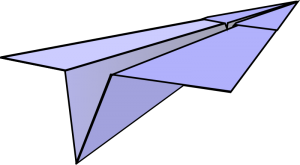What makes a good paper airplane?: Difference between revisions
JanetBlair (talk | contribs) (Created page) |
No edit summary |
||
| (9 intermediate revisions by 3 users not shown) | |||
| Line 1: | Line 1: | ||
{{Rinfo | {{Rinfo | ||
|type= Lesson idea | |||
|attribution={{PaulWarwick}} {{Fritha Fletcher}} | |||
|final=yes | |||
|title= What makes a good paper airplane? | |title= What makes a good paper airplane? | ||
|topic= | |topic= Forces | ||
|subject= | |subject= Science | ||
|resourcenumber= SC0045 | |resourcenumber= SC0045 | ||
|age= Primary | |age= Primary | ||
|content= Outline of an investigation | |content= Outline of an investigation into the action of air resistance on an airplane’s wings followed by some ideas on an alternative context in which to set the experiment (gliding animals). | ||
|strategy= | |strategy= | ||
|image= | |image=airplane.png | ||
|Learning Objectives= | |Learning Objectives= | ||
* to gain understanding of the nature of force and the way in which force acts on paper airplanes | * to gain understanding of the nature of force and the way in which force acts on paper airplanes. | ||
* to gather data and draw conclusions | * to gather data and draw conclusions. | ||
|additional resources= | |additional resources= | ||
|useful information= | |useful information= | ||
|related resources= | |related resources= | ||
*[[Floating and sinking| What floats and what sinks?]] | |||
*[[The Elephant on the Bridge]] | |||
*[[Bridges| Building bridges from a piece of A4 paper]] | |||
*[[Which material makes a good parachute| Which material makes a good parachute?]] | |||
*[[Forces in Static Situations]] | |||
*[[Floors and Pillars]] | |||
|other= | |other= | ||
|format= | |format= | ||
|resources= | |resources= | ||
*download the document here [[file:What_makes_a_good_paper_airplane?.doc]] or | |||
*view it on the wiki [[What makes a good paper airplane?/Lesson Document]] | |||
}} | }} | ||
[[Category:Primary]] [[Category: Science]] | [[Category:Primary]] [[Category: Science]] | ||
Latest revision as of 17:52, 2 February 2015
Lesson idea. Outline of an investigation into the action of air resistance on an airplane’s wings followed by some ideas on an alternative context in which to set the experiment (gliding animals).
Teaching approach. This activity supports these learning types:
- small group work(ta) - groups conduct an investigation and report back to the class.
- whole class(ta) dialogue(ta) - they discuss open-ended questions(ta): why did this happen? what do you think causes this movement?
- peer assessment(ta) – do peers agree?
- project work – the activity connects with others in this OER on forces, with literacy and numeracy and with topic work in design and technology.
- inquiry(ta)-based learning – an initial presentation to the class can be framed as a problem to solve; children work collaboratively (co-enquiry)
- arguing and reasoning(ta) – children persuade each other about their explanations.
- exploring ideas – the activity develops understanding of key scientific principles.
(edit)
| Resource details | |
| Title | What makes a good paper airplane? |
| Topic | [[Topics/Force|Force]] |
| Teaching approach | [[Teaching Approaches/Assessment|Assessment]], [[Teaching Approaches/Dialogue|Dialogue]], [[Teaching Approaches/Questioning|Questioning]], [[Teaching Approaches/Whole class|Whole class]], [[Teaching Approaches/Group work|Group work]], [[Teaching Approaches/Inquiry|Inquiry]], [[Teaching Approaches/Reasoning|Reasoning]] |
| Learning Objectives |
|
| Subject | [[Resources/Science|Science]] |
| Age of students / grade | [[Resources/Primary|Primary]]
|
| Related ORBIT Wiki Resources | |
| Files and resources to view and download |
|
| Acknowledgement | This resource was adapted from resources and original ideas contributed by Paul Warwick, at the Faculty of Education, University of Cambridge. |

